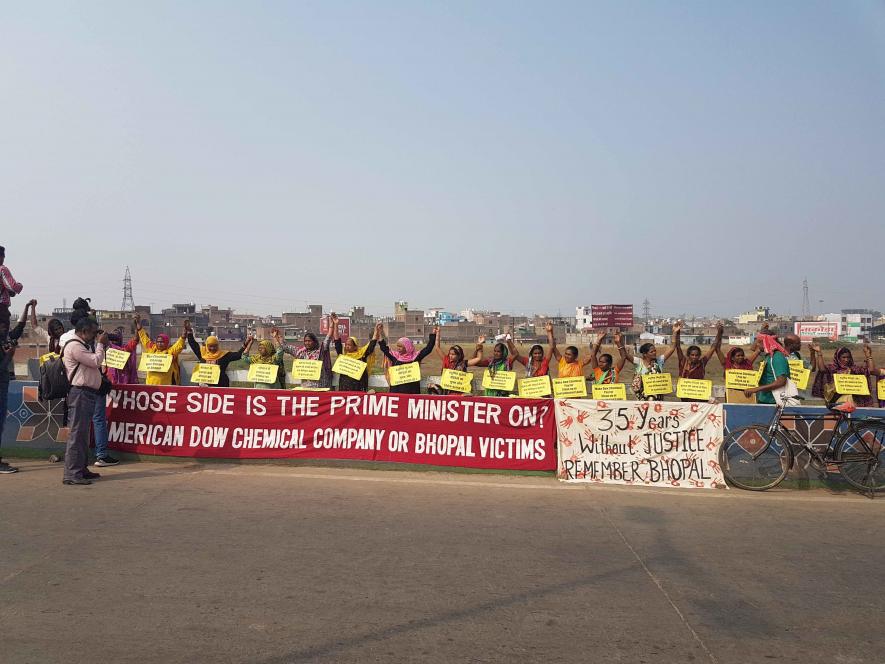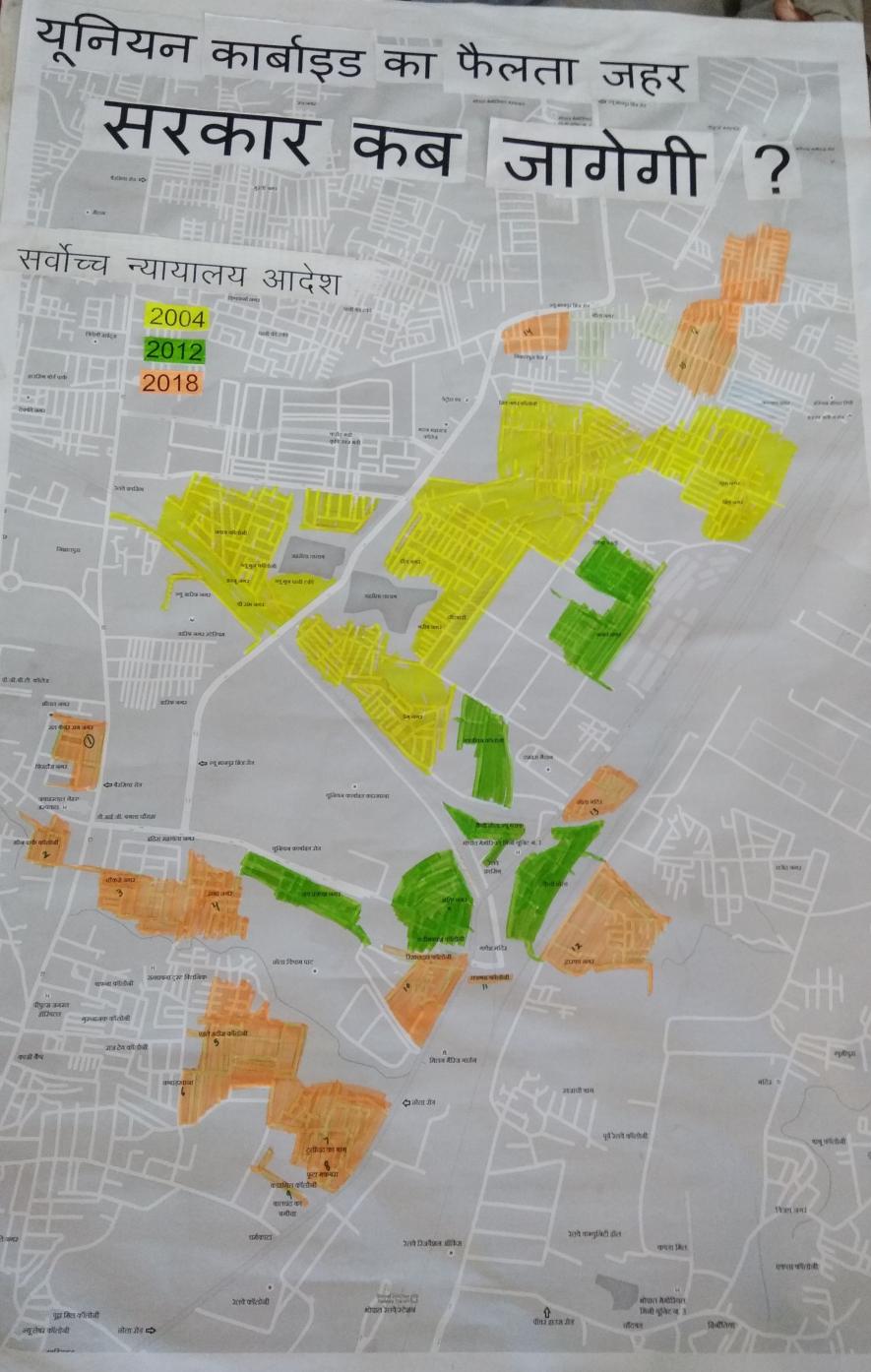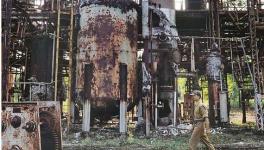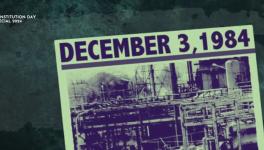Bhopal Gas Tragedy: Contaminated Groundwater Will Swallow City, Warn Victims

Bhopal: The issue of environment and water conservation created a country-wide buzz when Delhi’s air turned deadly, but there is no talk about the country’s ‘cleanness capital’ -- Bhopal – where lakhs of people are being forced to drink toxic water since the past two decades due to toxic chemical contamination cause by the Union Carbide factory.
After 12 years of the world’s worst industrial tragedy in 1996, the Madhya Pradesh government has buried the deadly waste of the Union Carbide factory by digging a pond adjacent to it. Nevertheless, the waste has leaked and has been contaminating the groundwater close to the pond.
The contamination is spreading slowly, say sources. In the past two decades, the toxic chemical has contaminated the groundwater of nearly 48 colonies, which was 18 earlier. Lakhs of people have been consuming this water every day.

According to a survey conducted by Indian Institute of Toxicological Research (IITR) in 2012, in groundwater of 42 communities situated around the Union Carbide factory and its health effects, toxic chemicals such as “Lead, Gamma HCH, Lindane, Beta HCH, Mercury, Aplha HCH, Alpha Naphthol, and Dichlorobenzene” were found in the groundwater.
Later, dozens of surveys were conducted by state as well as Union government agencies on groundwater in areas adjacent to the factory, its effect on gas-hit victims and those using contaminated water. But hardly a few of these reports saw the light of the day.
The reports had said that usage of toxic water had damaged the brain, nervous system, liver, lung and spinal cord of people residing in these areas, in particular the developing nervous system of a fetus or young child.
Cases of anaemia, skin lesions, vomiting, headaches, eye and respiratory tract irritation, anorexia, weight loss, yellow atrophy of the liver, blood dyscrasias, porphyria, and chromosomal breaks in blood samples have been reported.
The report further warned that usage of such toxic water could increase blood pressure in adults and also cause digestive problems, kidney damage, nerve disorders, sleep problems, muscle and joint pain, and mood changes. Exposure to excessive levels of lead can cause brain damage; affect a child’s growth; damage kidneys; impair hearing; cause vomiting, headaches, and appetite loss; and cause learning and behavioral problems. Blood disorders, dizziness, headaches, and possible changes in the levels of sex hormones in the blood are some other dangers to health.
Newsclick met some victims of the Bhopal Gas Tragedy, who have been using the contaminated water and have been suffering from various diseases, such as heart problem, joint pain, headache, skin-related issues, vocal problems and so on.
The toxic water has been reported to have even led to some deaths of children, new-born babies and pregnant women. Sara Khan, 17, from Annu Nagar lost her voice at the age of eight. Some have lost sight, while thousands of children are born with disabilities.
Nevertheless, neither state government nor the Union government is paying any heed to the issue of toxic water. Even, environmentalists and water conservationists are mum over the issue.
To register their protest, Bhopal Gas Trgaedy victims protested near the flyover bridge of the factory where the toxic waste was buried on Sunday afternoon and demanded removal of the waste, compensation and clean water to residents.
Ironically, the groundwater of Bhopal has been awarded for being the ‘second cleanest city’ of the country twice -- in 2017 and 2018 in a Cleanliness Survey, conducted by the Union government. In 2019, the city bagged the tag of the ‘cleanest capital’ city of India.
In 1984, the leak of toxic gas, methyl isocyanate, from the factory on December 2-3 midnight, had claimed thousands of lives. But, even after 35 years have passed, the factory still poses a threat to residents of the city.
“The toxic chemical waste of Union Carbide will eat up this beautiful city, if it’s not removed. The chemicals spreading in the groundwater of the city and soon will contaminate the water bodies of the city,” said Rashida Bee of Bhopal Gas Peedit Mahila Stationery Karmchari Sangh.
Rashida said the toxic chemicals waste of Union Carbide which is buried near the factory, has taken 48 colonies into its grip. Several surveys of the Union and state governments have also admitted this, but, no one is paying any heed to it.
“We are ringing the alarm bell before governments to save this city until it is very late. Union Carbide waste is like cancer in the heart of Bhopal,” she added.
After a long march, protest and the Supreme Court’s order, the Union Government released Rs 50 crore to provide clean water to the affected areas. But, even after nine years, the Bhopal Municipal Corporation has failed to provide clean water to the victims. In some areas, the municipal corporation supplies water for only half an hour in a day, which is inadequate for a family. As a result, the residents are forced to drink and use the toxic water.
“Toxic groundwater is a serious threat to the city,” said Rachna Dhingra of Bhopal Group for Information and Action. She said, “We have been demanding removal of chemicals, compensation and clean water to the colonies affected by the chemicals.”
Coming down heavily on the state government, she said, the Congress government had been talking about the ‘Right to Water’ and providing clean water to every household, but the Chief Minister should first pay attention to the state capital.
“During the 15 years of erstwhile (Bharatiya Janata Party) government, nothing has happened. We are hopeful of the current regime. The government should remove the deadly chemicals of Union Carbide buried near the factory and clean the groundwater of city.” she added.
Get the latest reports & analysis with people's perspective on Protests, movements & deep analytical videos, discussions of the current affairs in your Telegram app. Subscribe to NewsClick's Telegram channel & get Real-Time updates on stories, as they get published on our website.
























